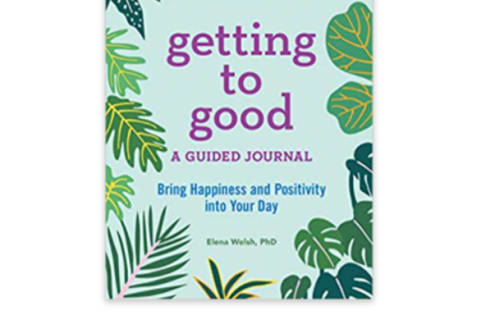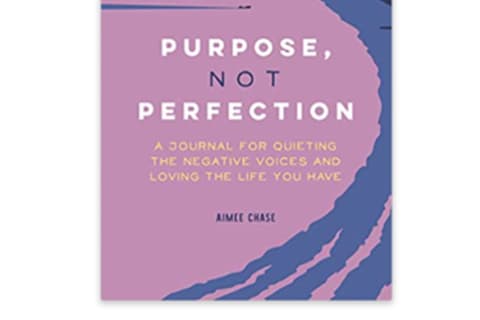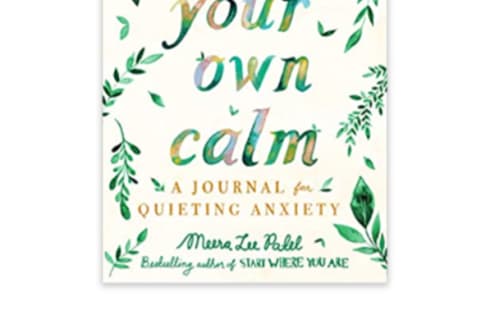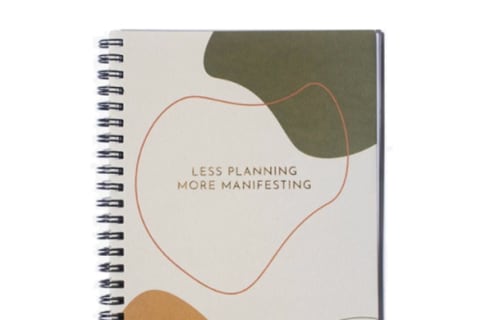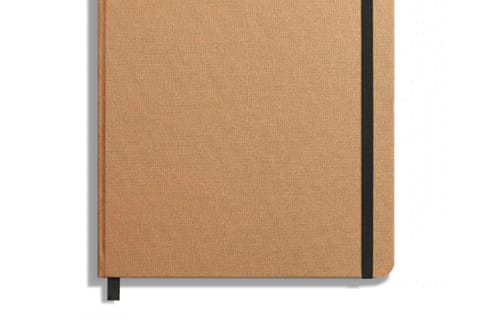Advertisement
How To Start & Stick With A Journaling Practice That Supports Mental Health


When's the last time you wrote something that you knew nobody else would read? While plenty of us stop journaling as kids, reintroducing the practice as an adult has been shown to work wonders for mood and outlook. Here, writers and therapists weigh in on how to start a journaling routine you'll actually stick with, for the sake of your mental health.
What does it mean to journal?
Most of the writing we do daily has an intended audience, but journaling is something you do just for you. It's a personal practice that you can do anywhere, at any time.
"You don't have to rack your brain to consider what you'll write about. You don't have to research. It's all in you," Aimee Chase, author of the guided journal Purpose, Not Perfection, says of what differentiates journaling from other forms of writing.
The purpose of journaling is different too. While most writing is about opening up and sharing, journaling is more about looking inward and exploring what makes you tick. "The purpose of journaling is to awaken conscious thinking, which is simply having an honest conversation with yourself," says Meera Lee Patel, an artist and author of many guided journals; Create Your Own Calm most recently.
"That doesn't mean being conscious of your writing—of the words you're using or the sentences you're forming," Patel adds. "In fact, if being hyper-aware of your writing is causing you to censor yourself, it defeats the purpose of journaling."
Types of journaling.
Journaling is an incredibly flexible practice that can be easily tailored to your needs and whims. Here are a few ways to do it:
- Free-form journaling: This "Dear Diary" style is what most people imagine when they think of journaling. It involves writing about whatever's on your mind that day—the good, the bad, and the ugly. While licensed clinical psychologist Elena Welsh, Ph.D., sees value in this approach, she notes that it tends to be more time-consuming than other journaling methods. It can also reinforce existing unhealthy thought patterns when not reread with a critical eye—which we'll touch on more later.
- Morning pages: A more regimented form of free-form journaling, writer Julia Cameron's morning pages technique involves handwriting three pages of thoughts first thing in the morning. The stream-of-consciousness method is meant to illuminate thought patterns and unlock creativity.
- Mindfulness journaling: Mindfulness journaling involves describing your current surroundings or emotional experiences in detail—paying attention to all five senses. It's a way to get out of your own head and connect to the present moment.
- Gratitude journaling: This is the journaling method that has been researched most extensively for its role in mental health. Gratitude journals are filled with things that you're grateful for. They can be larger things like your health or family, or smaller snippets like a cup of coffee or a funny conversation. The idea is that by bringing your awareness to positive situations, you're training yourself to notice them more often. Experts note that it can be helpful to express gratitude for setbacks as well, as well as share your gratitude with others.
- Mood check journaling: You can also use your journal to perform a quick mood check and write down how you're feeling in a particular moment. You can jot down a list, compose a paragraph, or even make a drawing; the goal is just to check in with yourself and your emotional state.
- Bullet journaling: The type-A journaler might enjoy the Bullet Journaling Method. It combines elements of a calendar, to-do list, and notebook and allows you to reflect, plan, and daydream all in one place. You can learn all the ins and outs of bullet journaling here.
- Dream journaling: Oh, the infinite writing fodder that lives in our dreams! Dream journals are a place for you to write down and analyze your dreams from the night before. In the process, you'll start to remember your dreams more clearly and might even get some insights into your subconscious.
- Tarot journaling: Similar to a dream journal, a tarot journal is a place to store thoughts and reflections on your last tarot, oracle, or any other spiritual reading.
- Guided journaling: Finally, those who are new to the practice of journaling might want to check out guided journals with built-in prompts and reflection exercises. "If you're someone who gets stuck worrying about what to write, guided journals take all that pressure away," Chase says. "They give you a little springboard for your thoughts."
The benefits of journaling.
These are just a few things you might expect to feel once you start journaling regularly:
Increased emotional awareness.
In today's demanding world, it can be difficult to find time to look within and consider how you're actually feeling.
Journals give you the opportunity to do just that, and they grant you safe space to name all the different emotions you may be feeling at any given moment.
Welsh says that this can be beneficial to mental health, especially when compared to the alternative. "The danger of not checking in is that when we're less aware of what we're feeling, it's more likely to impact our behavior," she says.
Alternatively, research shows that emotional awareness has been shown to decrease symptoms of anxiety1 and depression.
Improved mood.
Over time, journaling—particularly gratitude journaling—may improve mood. "We only have so many thoughts in a day. If the proportion of your thinking is negatively skewed, you're going to be in a negative mood," says Welch.
Calling your attention to positives may help restore this balance. She explains that in doing so, you're essentially training your brain to look out for the things that make you happy.
More mindfulness.
Writing about what's going on around you can help keep you in the current moment—and out of the past or future. Welsh explains that the brain has trouble regretting things that happened in the past or worrying about what's in store for the future when it's fixated on the present.
"If you're actively describing your surroundings, your brain can't worry as much about this or that," she says.
Better health overall.
Beyond reducing stress2 and boosting mood3, research has shown that expressing gratitude may help lower blood pressure, deepen sleep4, and improve self-reported health5 overall.
Want to switch up your gratitude logging? Studies also show that writing with your nondominant hand can help keep the brain sharp.
More resilience.
Journaling can be especially helpful during hard times. "While I do try to journal regularly, I find myself most compelled to write in my journal when I'm angsty or confused or trying to find a light at the end of a tunnel... Journaling is a habit that has gotten me through all of the bumpy stretches in my life," Chase says.
"Writing about my life also keeps things in perspective and reminds me that my experiences are worth telling," she adds.
Self-discovery.
Last but not least, journaling can help you get to know yourself a little better. "Through journaling, I have learned how to organize my thoughts, alleviate stress, and challenge certain ideas and habits I previously believed were inherent parts of me," Patel says of the lessons she's found on the page.
"I've learned not only that I'm capable of change but that I greatly value continuous inner evolution."
Tips for getting started.
There are no hard-and-fast rules when it comes to journaling (heck, you don't even have to handwrite if you don't want to!) but these pro tips can help you get the most out of the practice:
Read your old entries.
Most people know the experience of reading through old journal entries and totally cringing (which just goes to show how critical we tend to be of ourselves). But as painful as it may be, Welsh says that if you're using your journal as a therapeutic tool, reading through old entries is essential.
Doing so will give you a glimpse into how your mind works. And once you step away from an entry for a while, you'll find it easier to serve as an objective observer to your experience.
Every once in a while (you can set your own cadence here), Welsh recommends reading back your old entries, pen in hand, and circling any time you exaggerated (i.e., "I will never succeed") or put yourself down (i.e., "I totally messed up today.)
"This will help you notice, and thus start to shift, unhelpful habits you might have," she says.
Let your previous entries guide your future ones.
As you read through your old entries, you'll want to pay attention to any themes that come up in your distorted thinking. When you notice that a certain situation or thought is a trigger for you, that's your cue to investigate it more. You might choose to spend your next few entries exploring ways to shift this negative thought pattern.
Welsh notes that someone who has been through trauma might have trouble with this exercise or find that writing about personal problems only reinforces them. In that case, a mental health professional may be able to help you find new ways to approach them.
Play around to find a method that works for you.
Welsh says that beginners may need to try out a few types of journaling before finding what works for them. Try gratitude journaling one week and mood checking the next and see what sticks.
You can also play around with the frequency and quantity of your journaling, opting to do one or two longer entries one week and daily shorter entries the next.
If you're looking to make journaling a habit, try to do it every day.
No, you don't need to journal every day to get something out of it. However, you might like the structure of taking a few minutes to write daily and find that doing so makes it easier for you to keep up with the practice.
To help get yourself in the groove, Welsh says that journaling at the same time every day (first thing in the morning or right before bed are popular) or pairing journaling with another daily habit (like drinking coffee) can make it more second nature.
Chase recommends choosing a time when your mind is the clearest and you have the fewest distractions.
Set realistic expectations.
There is no magic amount of time you need to spend journaling to reap its benefits. On the contrary, when you put too much pressure on yourself to write a certain amount, it can cause you to give up on the practice altogether.
Instead, be realistic about the amount of time and energy you have to put into your journal, and tailor your practice accordingly.
"I place far less importance on how much time I spend journaling, concentrating instead on how it makes me feel when I do: which is usually in a better place than before I started," Patel says.
Chase adds that "our lives are all just too busy to lounge about journaling for hours, so I propose keeping your sessions short... And sometimes, if I really don't want to journal, I don't force it. Journaling should be fun. It should be a release, not an assignment or a duty."
Set yourself up for success.
Patel and Chase agree that where you keep your journal matters. After all, you'll want to make sure it's on hand when the inspiration strikes.
For Chase, that means leaving a journal out on her nightstand so it's within arm's reach before bed. Those with a more spontaneous personality may want to keep theirs in their bag so they can write on the go, Patel says: "Make it easy for journaling to become a part of the routine you already have."
But again, if a day passes by and you don't get around to opening your journal up, that's totally fine. When Patel isn't in the mood to write, she remembers that she's felt this resistance before and is always glad when she pushes past it. But "if that doesn't work," she says, "then I let it go and try again the next day."
Blank journals
Prompts to try.
With that, you're ready to fill up some pages. Get those pencils poised and get started with these thought-provoking prompts courtesy of Patel, Chase, Welsh, and the mbg archives:
- What do you want your life to look like in five to 10 years? Even more importantly, how do you want to feel?
- What are some little things you used to stress about that you now realize are not so important?
- If the natural landscape around you were a person, who would it be?
- What makes you feel anxious? What does that anxiety feel like? What are you afraid will happen? What action will you take if this happens?
- Describe your childhood bedroom using all five senses.
- Write a love letter to yourself.
- Picture a wise, loving, and more evolved version of you. Not someone else but the you you're meant to be. Imagine becoming that you. Describe yourself.
- What are you doing, today, as far as plans and action steps, to take good care of your future self?
- What does success mean to you?
- When do you feel most alive?
- Make a list of the major events that have shaped your life. Then, write down the struggles that have shaped who you are today.
- Write down the best 3 things that happened to you today, 5 beautiful things you saw today, 3 little habits you want to do tomorrow, and/or a goal you're excited to work toward in the future.
The bottom line.
There are a million different ways to keep a journal, and each one can teach you a lot about who you are and what you want out of life. Pair your writing with other accessible mental health tools like breathwork and meditation, and prepare to turn the page on new and potentially game-changing insights.
